The History of CUP Global
How the Global Cancer Update Programme has evolved over the last three decades
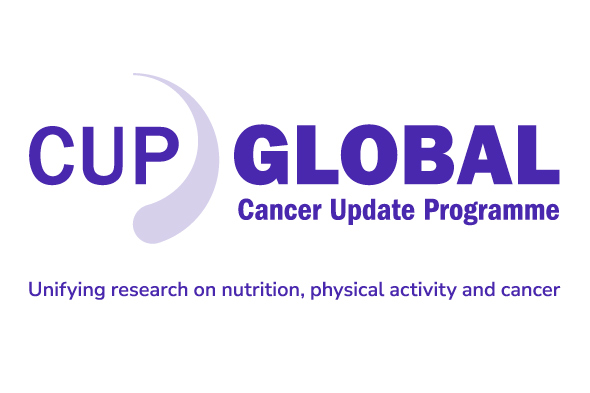
On this page
Where it all began: our first report
Food, Nutrition and the Prevention of Cancer: a Global Perspective
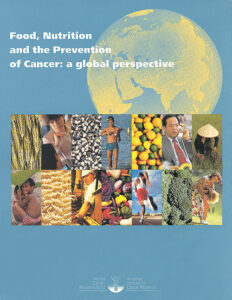 In 1997, World Cancer Research Fund (WCRF) and the American Institute for Cancer Research (AICR) published the report ‘Food, Nutrition and the Prevention of Cancer: a Global Perspective’.
In 1997, World Cancer Research Fund (WCRF) and the American Institute for Cancer Research (AICR) published the report ‘Food, Nutrition and the Prevention of Cancer: a Global Perspective’.
This was the first time that all the evidence related to the impact food and nutrition have upon cancer outcomes had been reviewed and reported in one place.
The results confirmed that modifiable behaviours, related to food and nutrition, can have a significant impact on cancer risk.
Following this novel first report, the evidence-base related to modifiable risk factors and cancer risk exploded – with an ever-increasing number of published peer-review studies and papers focused on the subject.
At the same time, the need for policy that could effectively address the global burden of preventable cancers – currently estimated at around 40% of all cancers – continued to increase. As a result, WCRF made the decision to embark on producing a new report in 2001.
The Second Expert Report
Food, Nutrition, Physical Activity, and the Prevention of Cancer: A Global Perspective
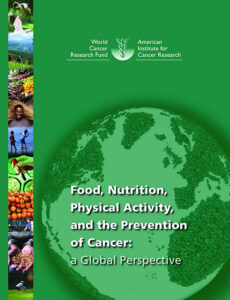 The research used to produce the Second Expert Report took over 5 years to complete.
The research used to produce the Second Expert Report took over 5 years to complete.
Published in 2007, this report was the first to use our newly-developed methodology and protocol for standardising the literature searches undertaken with our reviews. We also developed a new approach to the analysis and display of the evidence and results.
The Second Expert Report enabled the development of our Cancer Prevention Recommendations.
Since its publication, we have continued to undertake research to ensure that our Recommendations are based on the most up-to-date and sound evidence.
The results reported in the report came from systematic literature reviews, undertaken by 9 independent academic centres (located in the UK, Europe, and the US).
Each review explored the causal associations between different exposures related to food, nutrition, and physical activity and the risk of developing 17 site-specific cancers, as well as experiencing overweight and obesity. A separate review also explored interventions related to these exposures among those living with and beyond a cancer diagnosis.
The results of each review were then assessed by 21 international cancer research experts (referred to as the Expert Panel) in order to draw conclusions about potential associations between exposures and outcomes.
These conclusions were given grades of confidence and then used to inform our Cancer Prevention Recommendations to enable:
- the public to make healthier choices about their diet, nutrition, and physical activity to reduce their cancer risk.
- policymakers and researchers to use our research to inform their work and create health-enabling environments.
The CUP database was established to bring together all of the scientific literature in the SER. It is housed at Imperial College London, where it is still managed by a specialist scientific team.
The Third Expert Report
Diet, Nutrition, Physical Activity and Cancer: a Global Perspective
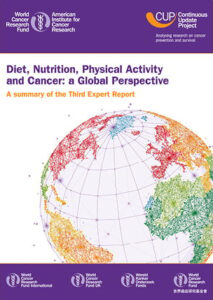
The Third Expert Report (TER), published in 2018 by the WRCF network of charities, built on the work of the SER and assessed the past decade of cancer prevention research and the links between diet, nutrition, physical activity, body weight and cancer.
The report identified many specific foods (for example processed meat) and elements of the human diet (for example alcohol) that play a key role in increasing or decreasing the risk of one or more cancer types.
As part of the TER, WCRF took a more detailed look at the impact of diet, nutrition, physical activity, and body weight upon cancer survivorship. This significant piece of work has grown in importance over the decades as more people are living with and beyond a diagnosis of cancer.
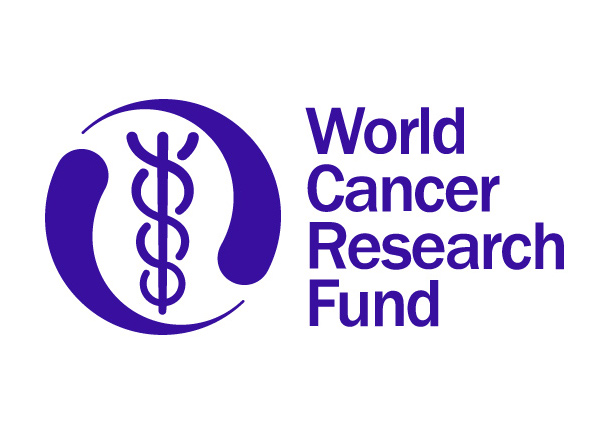
The history of World Cancer Research Fund
From our foundation in 1982, through to CUP Global and beyond
The TER continues to be a vital resource for anyone involved in cancer prevention and/or survivorship. It ensures that everyone, including researchers, policymakers, and members of the public, can access the most up-to-date information on how to reduce the risk of developing cancer, and the things individuals can do to live healthily after a cancer diagnosis.
It also identifies areas for future research in cancer prevention and survival. The TER still has an influence over the direction of the research undertaken by WCRF and our collaborators to this day.
For more information about the TER and to download a summary, or sections, of the report visit our resource library.
The ever-changing research environment
Since the publication of our first report, our understanding of several key areas within cancer research has increased. These include:
- How and why cancer develops
- How diet, nutrition, physical activity, and body weight impact disease risk and survival
- How to treat and care for people living with and beyond a cancer diagnosis
How we study the evidence, and methods for analysing and reporting research results, are also constantly developing. WCRF has always sought to keep abreast of the evidence and improve and adapt our analysis and reporting of it.
We are also aware that new challenges and questions will arise, and we need to be ready to meet these future challenges in cancer prevention and survival.
The transition from CUP to CUP Global
A new direction
Between 2020 and 2021, WCRF International convened a group of experts to assess every aspect of the existing CUP programme. The aim of this transitional phase (known as the ‘CUP Transition’) was to identify and prioritise the most compelling research topics that would form the focus of our future research.
As a result, the decision was made to develop seven key aims for our flagship programme of research. This new era called for a new name – the Global Cancer Update Programme (CUP Global) that we have today.
This process involved a 360-degree review of all aspects of our CUP Global research programme and was guided by an expert independent CUP Transition Panel.
Panel members, supported by a Secretariat, led 8 subject-specific workstreams. The results of these were synthesised to provide a blueprint for the future direction of CUP Global.
Overarching goals of transition
- For the World Cancer Research Fund network’s flagship research programme to stay at the cutting edge of its field.
- To continue to deliver a globally acknowledged benefit to the scientific, policy and clinical communities.
- To continue to provide Cancer Prevention Recommendations, through a more efficient process that removes the need for continual updating of the evidence.
- For future work to focus on addressing critical gaps in existing knowledge and advancing new knowledge. This approach will maximise impact, make efficient use of funds and provide new and innovative dimensions to our work.
The CUP Transition Panel identified 8 key topic areas of interest, based on previous CUP work with the addition of new areas judged to be relevant and important for advancing knowledge and public health in the field of cancer and nutrition.

These were:
- Evidence search and synthesis process: Evaluating the processes and methodologies underpinning the CUP to date, with the aim of increasing efficiencies and facilitating precise targeting of work.
- Dietary and lifestyle patterns: Identifying specific dietary and lifestyle patterns which have a significant impact on cancer risk.
- Obesity: More precise understanding of the risk factors for obesity across the lifecourse.
- Biological processes (mechanisms): Identifying the biological processes underpinning changes in cancer risk seen in epidemiological studies.
- Cancer subtypes: Identifying why and how different subtypes of specific cancers respond differently to dietary, nutritional, physical activity and weight exposures.
- Lifecourse: Identifying how different life stages influence cancer risk, including critical windows of time that may be particularly amenable to lifestyle interventions.
- Survivors of childhood cancers: Determining the impact of food, nutrition and physical activity on children with cancer from the point of diagnosis into adult life.
- Survivors of adult cancers: Identifying the impact of food, nutrition and physical activity from the point of diagnosis.
Each of the workstream areas was explored by a small group of leading international subject-specific experts, which included the CUP Transition Panel and the CUP Secretariat. They developed guidance on how practically to take each area forward and implement it as part of the next phase of the CUP.
Following detailed discussion, these 8 topics were organised into 4 key areas of work that were selected as the focus of the work that future CUP Global research and investigation and which guide the work we are doing today.